The End of Secrets
WikiLeaks, the frequent source or subject of frontpage news stories, has added a distinctly modern spin to unauthorized disclosures of files and data. Last spring, the Law School magazine invited a distinguished group of faculty and practitioners of both law and journalism to discuss the ramifications for our civil rights and national security of WikiLeaks and its inevitable offspring. Ira Rubinstein, senior fellow at NYU School of Law’s Information Law Institute, moderated the insightful and provocative discussion, which appears here, condensed and edited.
Printer Friendly Version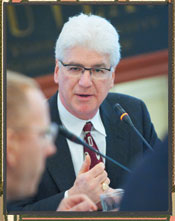 IRA RUBINSTEIN, Senior Fellow, Information Law Institute at NYU School of Law: WikiLeaks is the epitome of what some observers call the networked fourth estate: reporting and commentary that is Internet-based, decentralized, published by users rather than media outlets, more amateurish than professional, and much less dependent than newspapers on market financing. WikiLeaks began in 2006 and in its first several years won awards for exposing corruption around the world.
IRA RUBINSTEIN, Senior Fellow, Information Law Institute at NYU School of Law: WikiLeaks is the epitome of what some observers call the networked fourth estate: reporting and commentary that is Internet-based, decentralized, published by users rather than media outlets, more amateurish than professional, and much less dependent than newspapers on market financing. WikiLeaks began in 2006 and in its first several years won awards for exposing corruption around the world.
In 2010, however, it released a video showing U.S. helicopters firing on Iraqi civilians. Then it released hundreds of thousands of field reports from Afghanistan and Iraq, having redacted names of individuals who might be endangered. And finally, it worked with the New York Times and other major newspapers on a controlled release of 250,000 State Department cables. These three releases have caused a great deal of anxiety, especially in the United States, where Private First Class Bradley Manning, the apparent source of the leaks, is now in solitary confinement. And Julian Assange, WikiLeaks founder, is considered experts in the First Amendment, national security, Internet law, and journalism, what worries you the most about WikiLeaks or the responses to it?
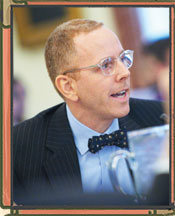 SAMUEL RASCOFF, Associate Professor of Law, NYU School of Law: The thing that’s causing deep-seated anxiety in the national security establishment is that the government seems to be structurally incapable of maintaining a secret. It’s not just that hundreds of thousands of sensitive diplomatic cables, dispatches from the battlefield, and records of covert operations have now been disclosed; it’s the sense that, going forward, the government will never be able to do anything without public knowledge and participation.
SAMUEL RASCOFF, Associate Professor of Law, NYU School of Law: The thing that’s causing deep-seated anxiety in the national security establishment is that the government seems to be structurally incapable of maintaining a secret. It’s not just that hundreds of thousands of sensitive diplomatic cables, dispatches from the battlefield, and records of covert operations have now been disclosed; it’s the sense that, going forward, the government will never be able to do anything without public knowledge and participation.
Couple that with the recognition that the available legal tools for addressing this state of affairs are actually totally ineffective. Whereas someone like Manning is certainly vulnerable to criminal prosecution of one sort or another, the likes of Assange are effectively immune from prosecution, on par with the New York Times itself.
There are two good news stories, however. One of them is that the leaks revealed thus far have not been terribly damaging to the reputation of the United States. In some ways, they’ve actually enhanced our reputation. American diplomats, generals, spies actually come across looking quite a bit more conscientious than some might have suspected. And whereas our legal architecture is radically ill-equipped, there are plausible information technology infrastructural fixes to the problem. So that’s got to be the way forward.
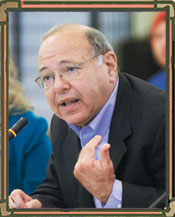 BURT NEUBORNE, Inez Milholland Professor of Civil Liberties, NYU School of Law: Widespread secrets in a modern society are a pipe dream. That’s as much a function of technology as anything else. When Gutenberg invents the printing press, all of a sudden the people who are in control are terrified because information is now going to be widely available to the masses. Milton is talking about unlicensed printing in Areopagitica. And in the United States, you had the 18th-century trial of John Peter Zenger, a printer. And so Assange is a modern heir to this notion of technology allowing widespread dissemination of information that is likely to be highly disturbing to the existing power structure.
BURT NEUBORNE, Inez Milholland Professor of Civil Liberties, NYU School of Law: Widespread secrets in a modern society are a pipe dream. That’s as much a function of technology as anything else. When Gutenberg invents the printing press, all of a sudden the people who are in control are terrified because information is now going to be widely available to the masses. Milton is talking about unlicensed printing in Areopagitica. And in the United States, you had the 18th-century trial of John Peter Zenger, a printer. And so Assange is a modern heir to this notion of technology allowing widespread dissemination of information that is likely to be highly disturbing to the existing power structure.
The stuff that comes out of WikiLeaks just reinforced my assumption for years that we have radically overclassified information. When you have a government that is bent on getting as much information as it can about individuals and goes through tremendous violations of privacy and violations of the Fourth Amendment and at the same time claims the ability to keep what it does secret, that’s just a formula for WikiLeaks. It’s a formula for rebellion: A government that doesn’t respect my privacy doesn’t have any privacy of its own. That’s what we’re living through now.
 JAY ROSEN, Associate Professor of Journalism, NYU: WikiLeaks is the first significant stateless news organization. Up to now, the press is free to report on what the powerful wish to keep secret because the laws of a given nation protect it. But WikiLeaks is able to report on what the government wishes to keep secret because the logic of the Internet permits it; it doesn’t require the law to protect it.
JAY ROSEN, Associate Professor of Journalism, NYU: WikiLeaks is the first significant stateless news organization. Up to now, the press is free to report on what the powerful wish to keep secret because the laws of a given nation protect it. But WikiLeaks is able to report on what the government wishes to keep secret because the logic of the Internet permits it; it doesn’t require the law to protect it.
The press we have in the United States has, through its own mythology, obscured the way that national law creates it. It sees itself as a counterweight, an adversary, a watchdog, but is actually embedded with the state. This is one of the reasons that the professional press’s reaction to WikiLeaks has been so distorted, disappointing, and error-strewn. The New York Times reporters and editors were very insistent on describing Assange as a source. If he’s just a source, they have rules and constructs for dealing with that. Of course, he’s not just a source because he has what Yochai Benkler calls the networked public sphere at his disposal. He has the ability to publish himself. He is, in fact, a news organization.
The real source is Manning, and the fascinating thing is that the sources are voting with their leaks. That is, they are choosing to go to WikiLeaks rather than the press. There must be a reason for that. But rather than interrogate that reason, our press has tried to belittle WikiLeaks, to keep it in a box that makes it more familiar. This insistence that he’s just a source is a little clue that the press is freaked out by WikiLeaks. A bigger clue is a finding in Benkler’s really excellent paper on WikiLeaks: that 60 percent of all the reports that appeared in newspapers and magazines falsely claimed WikiLeaks indiscriminately dumped all of the cables online. This factual inaccuracy can only be a result of anxiety about WikiLeaks and its presence in what had been a very closed club.
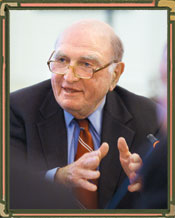 NORMAN DORSEN, Frederick I. and Grace A. Stokes Professor of Law, NYU School of Law: I doubt if we’ll hear a more important comment than Sam Rascoff’s: The reason for anxiety is ultimately that we can’t do anything about it. We have to rely on individuals to make decisions about whether or not they’re going to leak, publish, or otherwise disseminate information. This was also true in the Pentagon Papers case. The Times had plenty of other information that its editors regarded as secret and dangerous, and didn’t publish. But because of the Internet, these days we’re relying in a sense on everyone. That’s us. There are going to be a lot of leaks that are going to cause harm of some kind or another.
NORMAN DORSEN, Frederick I. and Grace A. Stokes Professor of Law, NYU School of Law: I doubt if we’ll hear a more important comment than Sam Rascoff’s: The reason for anxiety is ultimately that we can’t do anything about it. We have to rely on individuals to make decisions about whether or not they’re going to leak, publish, or otherwise disseminate information. This was also true in the Pentagon Papers case. The Times had plenty of other information that its editors regarded as secret and dangerous, and didn’t publish. But because of the Internet, these days we’re relying in a sense on everyone. That’s us. There are going to be a lot of leaks that are going to cause harm of some kind or another.
We’ve got to be tough on the people in the government who are subject them to cruel and unusual punishment, but if you’re in the government, how are you going to run the government if people are free to leak things to the world using their individual judgment?
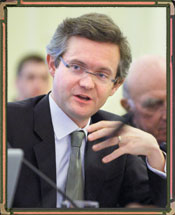 SIMON CHESTERMAN, Global Professor of Law, NYU School of Law: I don’t think Assange is Gutenberg. I don’t think Assange is that important. And the WikiLeaks “Cablegate” is not the Pentagon Papers. WikiLeaks is not the reason why the information got out. It’s the reason why the information was widely disseminated and hard to put back in the box. None of this would have come out in the absence of Manning.
SIMON CHESTERMAN, Global Professor of Law, NYU School of Law: I don’t think Assange is Gutenberg. I don’t think Assange is that important. And the WikiLeaks “Cablegate” is not the Pentagon Papers. WikiLeaks is not the reason why the information got out. It’s the reason why the information was widely disseminated and hard to put back in the box. None of this would have come out in the absence of Manning.
WikiLeaks is just taking advantage of the positive aspects of the Internet: that it’s decentralized, anonymous, user-driven. These are also the disadvantages. The real tension on the journalistic front is that, whereas some of the disclosures during the past decade about government abuse of authority have come out primarily because of quality investigative journalism, WikiLeaks is quantity journalism. Certainly WikiLeaks itself has confessed the inability to do quality control, and that’s why it had to rely on the traditional media.
It’s also important to note that the information that comes out was available to three million people in the U.S. government, which is why PFC Manning had access to it. And most of it, frankly, is quite marginal. Who didn’t know that Silvio Berlusconi was vain? Or Robert Mugabe is a crazy old man?
The things that were influential tended to be accidental. So there were bits and pieces published about Ben Ali in Tunisia that were not commented on until the population of Tunisia started getting access to that information and then used it in their campaign against him. We found out Muammar el-Qaddafi has a voluptuous Ukrainian nurse and is afraid of flying over water. But we didn’t find out that his people were going to rise up against him. The really useful stuff wasn’t there.
What worries me is the message that went around the world: that you need to be careful what you put in writing. Diplomats in the future will be wary about giving full and frank commentary. Decisions will not be based on minuted meetings. And that the entirely justified push for greater information sharing within the U.S. government after September 11 will be rolled back. We’ve already seen that with the State Department taking itself out of the SIPRNet.
This will not lead to what Assange wants, which is greater transparency. It will actually lead to less transparency, worse decision making, and less accountability, which seems to be a pretty high price to pay for gossip.
NEUBORNE: The closest analogy is the Pentagon Papers. They did prosecute Ellsberg. But the government’s case disintegrated because it had engaged in far greater violations of things we care about than Ellsberg’s leaking. So their criminal prosecution came unhinged and the case was dismissed. The Supreme Court never definitively decided whether the Times could have been prosecuted. If you read the Pentagon Papers case very, very closely, you find that there are not five votes for the proposition that no criminal prosecution could have been brought against the Times under the Espionage Act.
DORSEN: I’m not sure that the Pentagon Papers case would be decided the same way today. The vote was 5-4, and as Burt suggested, White and Stewart concurred on a very narrow ground that would not cover the statutory espionage case. But in a way, that’s not too important. Despite the attention given to the Pentagon Papers case, it was a unique situation where the Times and the Washington Post published the materials serially. They told the government in advance, so then the government could come in and ask for an injunction. But supposing they published all the information the same day? There would be no injunction. It would be a question of criminal liability.
RASCOFF: Let’s go past the black-letter First Amendment law here to a more policy-oriented discourse. The fact is that the New York Times in the last decade published at least two stories, one about warrantless wiretapping, the other about the so-called Swift program, the consequences of which were felt around the world, and specifically within the American national security establishment. In both cases, the Bush administration had actively engaged the New York Times and sought to have them delay publication or not to publish at all, but ultimately the Times did publish both stories. The implications for national security were more significant than the stuff that WikiLeaks put out.
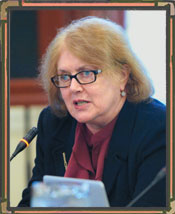 DIANE ZIMMERMAN, Samuel Tilden Professor of Law Emerita, NYU School of Law: It’s very easy to think of WikiLeaks as carving out entirely new territory, but in fact these problems with leaks of sensitive information are recurrent. The press has sometimes declined to publish things and sometimes regretted it afterward; the Bay of Pigs comes to mind. The New York Times knew about that before it happened; they were asked not to publish the story. They acceded. Afterward, President Kennedy said he wished he had either never asked them to or they hadn’t paid attention to him.
DIANE ZIMMERMAN, Samuel Tilden Professor of Law Emerita, NYU School of Law: It’s very easy to think of WikiLeaks as carving out entirely new territory, but in fact these problems with leaks of sensitive information are recurrent. The press has sometimes declined to publish things and sometimes regretted it afterward; the Bay of Pigs comes to mind. The New York Times knew about that before it happened; they were asked not to publish the story. They acceded. Afterward, President Kennedy said he wished he had either never asked them to or they hadn’t paid attention to him.
It would be a shame if the desire to get Assange leads us to bend our law, because there’s an awful lot of important information that comes out in the form of leaks. Government is not the most reliable representative of its people. An example occurred recently in Japan, where they attempted to underplay the damage to the cooling system of those reactors. There are things that governments do because it’s convenient, it’s pragmatically desirable, but it’s not necessarily for the public good. We have to be sure we don’t shut off all avenues of public dissemination of controversial information.
RUBINSTEIN: The Pentagon Papers were obviously very lengthy, but Ellsberg had a specific goal in mind, a single topic. WikiLeaks promises that all diplomacy, all military action may now be carried out in the shadow of permanent, massive leaks. Does the scale make any difference?
ZIMMERMAN: I don’t know how much difference it makes. One of the things about having a gazillion tons of information out there is nobody can process it all. Somebody has to sift through and pick out what is important in that mass of material.
ROSEN: The scale of the leaks that are possible and the scale of their distribution is different than the Pentagon Papers. But nobody was asking about scale when they vastly increased the number of secrets, right? That’s the problem of scale right there.
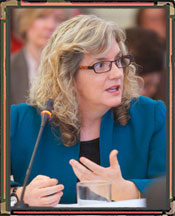 KATHERINE STRANDBURG, Professor of Law, NYU School of Law: WikiLeaks is not really the scary story because in fact they haven’t just put everything indiscriminately up there; they redacted some things, they worked with the newspapers, and so forth. If we go too hard after WikiLeaks, we will drive leakers even further underground and end up with indiscriminate leaking rather than consultation with the New York Times.
KATHERINE STRANDBURG, Professor of Law, NYU School of Law: WikiLeaks is not really the scary story because in fact they haven’t just put everything indiscriminately up there; they redacted some things, they worked with the newspapers, and so forth. If we go too hard after WikiLeaks, we will drive leakers even further underground and end up with indiscriminate leaking rather than consultation with the New York Times.
Without some trusted vetting organization, you just have anonymous dumps of information that might well include information that is just fabricated. It could even be disinformation from the government or from another espionage service. Once you have a huge quantity of supposedly leaked material, it’s very hard to vet each individual document to see if it’s really genuine. And given that these are digital documents, they’re also pretty easy to alter, so you have to have some way of figuring out how we know that all of these documents came from the source they’re supposed to have come from. This is a big concern.
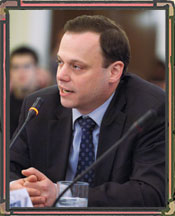 BRIAN MARKLEY ’00, Partner, Cahill Gordon & Reindel: I am troubled by the way WikiLeaks went about disseminating this information and, by contrast, I admire the way the New York Times went about its coverage. What the Times did, as described in various stories they’ve published, was to go in and sit down with administration officials and genuinely listen to concerns about leaks that could harm people, and there were things that were redacted as a result. They redacted soldiers’ Social Security numbers. They redacted the names of Afghan informants. They chose not to publish information about how to disable devices that themselves disable IEDs in Iraq and Afghanistan.
BRIAN MARKLEY ’00, Partner, Cahill Gordon & Reindel: I am troubled by the way WikiLeaks went about disseminating this information and, by contrast, I admire the way the New York Times went about its coverage. What the Times did, as described in various stories they’ve published, was to go in and sit down with administration officials and genuinely listen to concerns about leaks that could harm people, and there were things that were redacted as a result. They redacted soldiers’ Social Security numbers. They redacted the names of Afghan informants. They chose not to publish information about how to disable devices that themselves disable IEDs in Iraq and Afghanistan.
Each of those things was disclosed by WikiLeaks. While maybe it was inadvertent, there were quotes from Assange himself in the New Yorker about how he’s not able to look at every piece of information and there will be what he called “collateral damage” that might harm individuals. I’m not saying that WikiLeaks should be prosecuted, because there are ramifications from that, too. We just need to think about all of this in context.
Lastly, among the things that concern me and members of the media is that the reporters’ shield law that was moving forward in Congress is now basically dead in the water, in part due to WikiLeaks. It had passed the House, and while it wasn’t perfect from our perspective—it defined journalists too narrowly— we needed something in the wake of developments such as the Judith Miller incarceration. The bill had gone through the House and the Senate Judiciary Committee and then was simply shut down in the wake of WikiLeaks.
ROSEN: WikiLeaks did ask the government if it would help it redact information that should not be released, and the Pentagon told them to go to hell and return all the documents. That should be mentioned when you talk about the difference between the Times and WikiLeaks.
If the press had been doing a better job at being a watchdog, at uncovering what had to be uncovered—if, for example, we had a press that was capable of preventing a phony case for war from being passed into history—maybe the leakers wouldn’t be voting with their leaks by going to WikiLeaks, an upstart, unknown organization. Maybe they would be going through these allegedly more responsible channels of the New York Times. I don’t think you can separate press failure from the popularity and viability of WikiLeaks.
NEUBORNE: You can’t have a worse situation than we’ve been living under. One of the more enraging things in recent years has been the government insisting on a very broad set of secrecy norms, and then selectively leaking information to journalists in a way that would enhance their particular political views. We’ve been manipulated as a people now for the past 25 years by selective leaks that lead us toward war. It is inevitable that institutions like WikiLeaks will rise up when you overclassify so that vast amounts of material are secret, and then you selectively release information to handpicked journalists who then write in distinguished newspapers that shape public opinion. So I acknowledge that there’s a cost, Simon. There will be a smaller number of people discussing the information. But the question we have to ask is, “Are we better off with secrets or without them?” Fundamentally, we’re better off without them.
DORSEN: I have a rather more pessimistic and less idealistic view about government than my good friend Burt. What he describes is nothing new. What do we think Franklin D. Roosevelt was doing when he made the destroyer deal with Winston Churchill in 1940? I could go back to Wilson in the First World War, and probably to Lincoln.
CHESTERMAN: After the McCarthy hearings, Edward Shils had a wonderful line: Liberal democracy depends on protecting the privacy of individuals and denying it to governments. In theory that sounds like a wonderful model, but in practice the last halfcentury has seen exactly the opposite happen.
It would be a mistake to believe that governments cannot still keep secrets. They keep vast amounts of information secret still. The material that’s been disclosed was only at the “secret” level, nothing above that level.
Yet a slightly different problem is the danger of what happens when you do get access to classified information. One is that you mistake words like “secret” or “top secret” as meaning “true.” It doesn’t mean true. It just means damaging if it got released. So there’s a danger that you overvalue classified information and that you therefore undervalue other information. Likewise there’s a tendency to think that WikiLeaks is special because of this privileged access. I completely accept the problems concerning journalism in the lead-up to the Iraq War, but in the last decade, the big scandals that have been released through traditional news media were things like warrantless electronic surveillance, extraordinary rendition, torture, and I don’t see any suggestion that Manning went to WikiLeaks because he had a scandal that he wanted to identify that the New York Times was not going to publish. He went to WikiLeaks because WikiLeaks was the venue of choice for volume or quantity disclosures rather than quality investigative journalism.
RUBINSTEIN: There’s a tension between traditional journalism, despite some of its failures, and the very different approach of WikiLeaks over the question of whether and to what extent journalists are using their judgment of the public interest in deciding what to publish, what to investigate, and how to go about this.
MARKLEY: WikiLeaks is trying to look like a journalist. If you look at its website, the words journalist or journalism appear all over it. But at its core it’s not very journalistic, at least in the traditional sense. Assange himself has said, “We are not the press.” WikiLeaks doesn’t provide any analysis, there’s no context in the disclosures, there’s no alternative view presented about the cables and the other disclosures. There’s no one’s interpretation. Those are the sorts of things that we generally associate with being a journalist. Now, it’s true that a lot of journalism is just reporting plain facts. The crime blotter, for example, is just facts. But there is some thought and editorial process that goes into the facts that are disclosed.
All that being said, I don’t think it much matters. Whether we call them journalists or not is irrelevant. It may come into play if we start defining who’s covered by a federal shield law and state shield laws. It’s completely irrelevant, however, for the purposes of the First Amendment. It’s well established that everyone’s entitled to free speech, not just journalists.
ZIMMERMAN: There’s a big difference between deciding what a journalist is in lay language and deciding what a journalist is for First Amendment purposes. Frankly, that’s a line that nobody’s ever been able to draw. Long before WikiLeaks came along, the Supreme Court had essentially thrown up its hands collectively
at the idea of being able to draw a real distinction between “the press” and individuals for purposes of speech protection. It’s more a question of a distinction between mass dissemination and private dissemination. Truthfully, the blurring goes back to our historical roots because the people who were the first “press” were oftentimes just individuals who had a printing press and individuals who had a soapbox. We weren’t talking in the 1800s about a professional press. We were talking about people who had big mouths and a way of disseminating what they wanted to say, true or untrue.
ROSEN: When I started teaching journalism 25 years ago, it was very common for professional journalists to say, “We’re the only profession who’s mentioned in the Constitution.” I used to look at people who would say this as if they were nuts because it says Congress shall make no law abridging freedom of the press. It doesn’t say journalism. It doesn’t refer to a profession.
What is so threatening to professional journalists about WikiLeaks is that it completely explodes this notion of an occupational group that somehow carries out the First Amendment functions that really belong to the people. The contrast between professional journalism and WikiLeaks is overdrawn. WikiLeaks does perform an editorial function. WikiLeaks has not published any significant documents shown to be fake. WikiLeaks does engage in verification before they publish something, and any way you look at it, verifying that this document is what people said it is is a journalistic act.
NEUBORNE: The press clause means something. The First Amendment says “freedom of speech” and “freedom of the press,” so the press has to mean something more than the freedom of speech, or else it’s just an inkblot. What WikiLeaks does, at least in my mind, is it illustrates the flip side of Jay’s point. There are large numbers of people who are now performing that function in ways that we never dreamed the function would be performed.
Bloggers, for example. The whole blogosphere is a massive perversion of the press but nevertheless is the press. WikiLeaks falls into that. Structurally, the press has an enormous role to play, not just as the disseminator. It wasn’t just a Xerox machine or a loudspeaker for somebody else’s speech; it was a filtering mechanism. It was a way that enabled people like me who don’t have time to verify everything that comes over the transom that it will have passed through some responsible set of hands who did either a good or a bad job of deciding what got published, but at least thought about it. Without that filtering device, I wonder whether free speech is going to be as powerful.
DORSEN: A.J. Liebling wrote that freedom of the press belongs to those who own one, and these days everybody owns one. That’s the world we’re in.
The Supreme Court considered Burt’s view on separate protection for the press, and Burt got one vote: Justice Stewart. One of the reasons is that liberals such as Justice Brennan believed more protection for the press would mean reduced protection for everybody else. But let’s talk about the press protection statutes that Brian mentioned, the shield laws. We now have many different statutes, but the press, which is national, is subject to different laws by state. It’s a shame that the federal law was rejected, because for the first time we would have had a consistent rule.
STRANDBURG: This issue of professionalism versus crowdsourcing, you might call it, is a general issue that the Internet raises and a real dilemma in many arenas. Is there some mechanism for vetting? Some of the things that work in other contexts, like restaurant reviews or Wikipedia, where you just get a lot of people and they all tell you what they think, I’m not sure that leaks can work that way. Collaboration with the mainstream media can work. But that’s not going to be open to everybody who wants to post a bunch of leaks on the Internet. We need something more.
CHESTERMAN: As someone based in Singapore, I think one of the great absences in much of the world outside the United States is quality investigative journalism on the level of the New York Times, the Washington Post. Historically, the most important factor in ensuring accountability of government in these most secret areas, second only to its self-restraint, has been investigative journalism.
ZIMMERMAN: The responsible filter, the press that we idealize, is going into the pits because none of us wants to pay for it. As long as we think that everything should be free and we should be able to log on and see anything we want to, we can’t support serious journalism. It costs a lot of money to have reporters in the field, around the world, and people seem quite unwilling to pay for it. That’s a serious problem.
One of the things that I worry about with WikiLeaks, even though we’re an awful lot better off knowing most of this stuff, is the problem of danger to individuals. WikiLeaks has been actually much more careful than we had any right to expect. There are going to be others that may get information that can lead to harm to individuals who won’t be so careful. That is really a scary problem, and I don’t know how we deal with that.
But one thing for sure is that we would have an awful lot stronger ground to stand on in trying to protect the things that are important if we actually limited classification to real secrets. Almost a million people have clearance—850,000 for the top level of security documents. That’s an awful lot of people, and even in that category there’s a lot of stuff that simply doesn’t belong there. If we tried to protect less, we’d be able to protect it better.
ROSEN: Here’s a radical proposal: What if public statements and private behavior came more in line? That’s not the way diplomacy works: We put this out for public consumption, and then we do this other thing. Maybe that is what’s outmoded. We actually have experience with this; I don’t assume that my e-mails are actually oppressed me. I’ve realized that I have to actually bring what I believe in line with what I tell people.
On this question of filters, the Internet has a kind of a cycle to it. First we get these improvements that allow there to be this explosion of uncontrolled, unfiltered information. And that becomes unmanageable. Instead of throwing up our hands and drifting on a sea of information chaos, what comes is improvements in filters. As my friend Clay Shirky says, “There is no such thing as information overload; there’s only filter failure.” No matter how much information there is out there, we still need to trust reliable accounts. There’s a demand for that. Filters themselves will become part of Benkler’s networked public sphere. This is actually happening right now in reporting on things like disasters, conflicts in Libya and the Middle East where reports come in over the Internet, and the Internet itself has to figure out how to filter wand check those reports.
MARKLEY: I generally agree that public and private statements ought to be the same, but there is also a genuine need for secrets. For example, one of the WikiLeaks disclosures dealt with the government in Yemen authorizing bombings of al Qaeda bases while they were telling their people they weren’t behind it. That was a positive secret from my perspective. If public statements had matched the private statements, we wouldn’t have been in a position to attack al Qaeda. There were other examples involving, for instance, President Mugabe’s opponent who was privately supporting sanctions against his country while publicly opposing them.
RASCOFF: It’s not simply a question of officials dissembling and then becoming exposed. Very significant issues of timing are involved here. Supreme Court opinions ultimately see the light of day. You get majority opinions and you frequently get dissents, but we don’t have a culture in which it’s been acceptable for those opinions to circulate in newspapers or WikiLeaks prior to their release. It sometimes seems that the only two institutions in our society that can keep a secret are the Supreme Court and Apple. Can you imagine the outcry if the iPad3 design were exposed tomorrow on WikiLeaks? Secrecy, if only for the sake of preserving the official right to time the decision, is a necessary fact of running any government agency or any business.
RUBINSTEIN: Let’s look at the role of the private sector. At the request of members of Congress, a number of private companies either shut off WikiLeaks’ domain name access or cut off its hosting services, and then other companies began to eliminate its ability to accept payments on the Internet. Is it a problem that the private sector, with its very significant role in the Internet infrastructure, may be in a position to take steps that we would consider improper for the government to take? Or that the government may in fact be pressuring private firms to take these steps?
STRANDBURG: There’s cause for concern that in fact private entities are able not only to put into practice government objectives in ways that the government would not be able to do, as a matter of constitutionality or democratic legitimacy, but that those private entities are also able to manipulate communications to serve their own goals. Think back to the previous election when there was a flap about a NARAL Pro-Choice America text message that Verizon didn’t let through. Later Verizon said it was a mistake, but that could have been an exercise of private censorship power. The circumstances under which communications providers are permitted to disclose information to the government is regulated, but what they can do about taking people’s access to lines of communication down is not.
We should also consider what happens after a private party denies WikiLeaks access to payment systems or Internet service. The response is often also a private one. Organizations like Anonymous, basically hackers, attack the payment providers and so forth in retaliation for their denial of service to WikiLeaks. One can say this is good, this is protest, so this is the way we’re getting the democratic legitimacy. But it’s really mob rule. It’s not like protest historically, where the more people you get, the more effective you are. Small numbers of people can be extremely effective at these kinds of Internet shutdowns and other attacks. So on the whole, there is a worry about getting out of rule-of-law territory so that we’re no longer talking about protected speech and breaches of rights being handled through law.
NEUBORNE: When I was younger, if a newspaper published something that offended a very large advertiser, the advertiser would pull the advertisement. We were convinced that lots of American newspapers were being manipulated by the local advertisers, especially about civil rights.
I’m glad we’re talking about private controls on information because the last time I looked, seven large corporations in the United States owned every single media platform other than an Internet medium, whether it was a book publisher, a newspaper, a magazine, a television station, a radio station. Now, I don’t suggest that there’s anything nefarious necessarily going on there, but it is a dangerous idea to allow that kind of private concentration over the control of information, especially when we then say that the private concentration is reinforced and protected by the First Amendment. The response that I thought was going to emerge would be an Internet response—in other words, an alternative set of information that was not controlled by them.
The flip side of WikiLeaks is Switzerland, where you have terrific privacy and terrific control of information, and unbelievable abuses that go on under the shadow of secrecy. It’s why nobody in South America pays taxes, because they can have accounts in Switzerland and no one will find out about it because of privacy and control about information.
RUBINSTEIN: The irony is that although we began by describing WikiLeaks as Internet-based, decentralized, et cetera, in effect it’s the one large organization doing this type of activity. But every mainstream media outlet could have its own WikiLeaks operation, as could specific organizations with expertise in different areas such as the environment, energy, human rights; each could have a WikiLeaks operation. Is that a more attractive model?
ROSEN: That’s already happening. Al Jazeera has its own drop box. The Los Angeles Times this week put out an appeal to people to send in government documents that would allow it to find more stories like the one in Bell, California, where the city manager was being paid over $700,000. And there’s an organization, OpenLeaks, that’s designed to enable any organization, news or non, to have its own secure drop box. That’s one reason why prosecuting Assange is idiotic, because the secret is out.
ZIMMERMAN: One thing that makes you think lovingly about the system under which we regulate telephones is you have to wonder if we should allow so much private censorship. We did tolerate it in the past, in part because we thought that it was sporadic and that there would be counterbalances. If Procter & Gamble withdrew its ads, somebody else might come in and advertise. But what we really have here is the potential for systematic censorship by virtue of the basic infrastructure of the Internet.
STRANDBURG: We tend to think that networks are so very dispersed, that they’re equal and egalitarian and so forth, but in general networks tend to organize themselves into a system in which there are highly connected nodes and highly unconnected nodes. The Internet was developed to withstand an attack, but that’s if you attack a random node. If you attack a supernode, where a concentration of connections is, like the domain name server or something like that, the Internet can in some ways be highly concentrated.
ROSEN: At the time when Amazon cut WikiLeaks off from its rentable server capacity, Newsweek.com was hosted on Amazon. I was astounded that the mainstream media didn’t react much more forcefully, because it threatens them just as easily as it threatens WikiLeaks. That that could happen, that there was no legal challenge to it, that Amazon wasn’t ashamed to do that, that the CEO of Amazon never even had to address it, is amazing. We don’t have the Internet we thought we had.
Ira Rubinstein then invited questions from the audience.
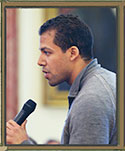 JERAMIE SCOTT ’12: Professor Rascoff, although we don’t expect to see the drafts of Supreme Court opinions, there is an expectation that the reasoning in the opinion that’s made public is what the reasoning is behind closed doors. That may not be the case, but there’s that expectation.
JERAMIE SCOTT ’12: Professor Rascoff, although we don’t expect to see the drafts of Supreme Court opinions, there is an expectation that the reasoning in the opinion that’s made public is what the reasoning is behind closed doors. That may not be the case, but there’s that expectation.
RASCOFF: But see Bush v. Gore.
SCOTT: Yes, but the larger point is that if you’re not trying to maintain consistency in public and private, aren’t you undermining the people’s ability to make a decision? If you’re saying you’re going to war because of national security reasons or saying you’re bombing Libya because we’re trying to protect the people but the real reason is oil, aren’t you undermining the people from making choices about their government that is supposed to represent them?
RASCOFF: Ultimately a relationship between a people and the government depends on some amount of trust. If there’s a prevalent view that the people are being bamboozled consistently by the state, by politicians, by the national security apparatus, you have a breakdown in the social contract. More transparency may be part of the solution. But this tension was not first identified by Julian Assange. It fundamentally implicates 3,000 years of Western political theory about the relationship between what gets said publicly and what gets done behind closed doors in government, and how accountability functions.
ROSEN: We need to cut way back on the number of people who think they’re smart enough to say one thing in public and do another in private and control it. You can’t control it, and that’s one of the messages of WikiLeaks.
CHESTERMAN: The diplomatic angle on this is worth touching on, yes, he means maybe. If he says maybe, he means no. And if he says no, he’s not a diplomat. In addition to the Yemen example that was highlighted earlier, the sotto voce Arab support for U.S. and Western handling of Iran was one of the things that was appropriately kept secret. Now it makes it that much harder for certain Arab governments to cooperate with the United States.
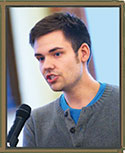 KYLE ALAGOOD, Research Associate, Liberty & National Security Program of the Brennan Center for Justice at NYU School of Law: How might we reconcile the recommendations of the 9/11 Commission— that all the agencies need to share their information—with the problem that seems to exist from someone like Manning, a very low-level army private being able to access the information? How do we not clamp down too much on secrecy but also keep the 9/11 Commission’s recommendations intact?
KYLE ALAGOOD, Research Associate, Liberty & National Security Program of the Brennan Center for Justice at NYU School of Law: How might we reconcile the recommendations of the 9/11 Commission— that all the agencies need to share their information—with the problem that seems to exist from someone like Manning, a very low-level army private being able to access the information? How do we not clamp down too much on secrecy but also keep the 9/11 Commission’s recommendations intact?
CHESTERMAN: Rather than limiting the sharing of information, another approach would be to move away from the current 1950s approach to counterintelligence, which relies on polygraphs and background checks. The CIA, the NSA, various other agencies have less-effective security protocols than many banks. In a bank, security is less a matter of background checks than it is a process of continuous monitoring to look for suspicious behavior. In the history of the United States, there have been 130 or so traitors who have given secrets or sold secrets to the enemy; 128 of them did it for money. This is not something that you can necessarily see in a background check.
ZIMMERMAN: There needs to be a cost-benefit analysis. I don’t know why Manning had the kind of access that he had. If you read what’s been written about him, he does seem to have been a person likely to become disaffected. But I don’t think we can expect to protect secrets in every case. We’re going to have to weigh the value of dissemination against the risk of disclosure. In the long run, I don’t believe it will have all that much effect on how people conduct their meetings or exchange information, because we will fall back into our old patterns. That’s what we do.
—
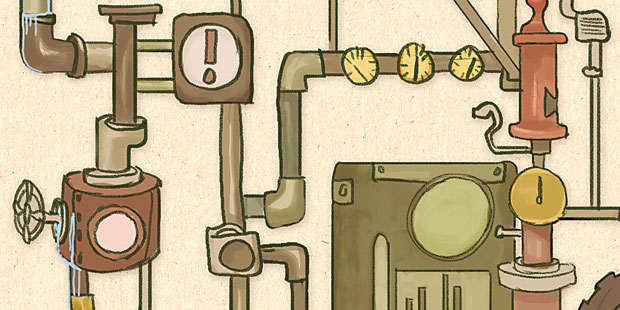
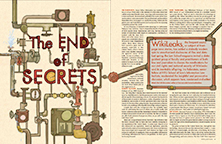
 Multimedia
Multimedia